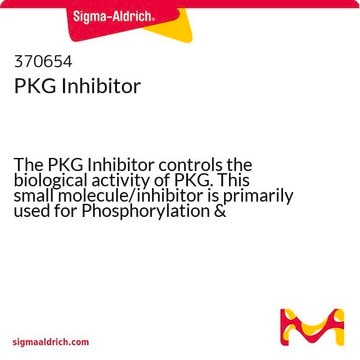B6684
Rp-8-Bromo-β-phenyl-1,N2-ethenoguanosine 3′,5′-cyclic monophosphorothioate sodium salt
≥98% (HPLC), powder
Synonym(s):
Rp-β-Phenyl-1,N2-etheno-8-bromoguanosine 3′,5′-cyclic monophosphorothioate sodium salt, Rp-8-Br-PET-cGMPS
About This Item
Recommended Products
Assay
≥98% (HPLC)
form
powder
potency
30 nM Ki
color
white to beige
mp
240-300 °C (lit.)
solubility
H2O: 15 mg/mL at ≤60 °C
storage temp.
−20°C
SMILES string
O.[Na+].O[C@@H]1[C@@H]2O[P@]([O-])(=S)OC[C@H]2O[C@H]1n3c(Br)nc4C(=O)n5cc(nc5Nc34)-c6ccccc6
InChI
1S/C18H15BrN5O6PS.Na/c19-17-21-11-14(24(17)16-12(25)13-10(29-16)7-28-31(27,32)30-13)22-18-20-9(6-23(18)15(11)26)8-4-2-1-3-5-8;/h1-6,10,12-13,16,25H,7H2,(H,20,22)(H,27,32);/q;+1/p-1/t10-,12-,13-,16-,31-;/m1./s1
InChI key
SVMPQLHYWRTQCX-DBHVCDLJSA-M
Biochem/physiol Actions
Features and Benefits
Legal Information
Storage Class Code
11 - Combustible Solids
WGK
WGK 3
Flash Point(F)
Not applicable
Flash Point(C)
Not applicable
Personal Protective Equipment
Certificates of Analysis (COA)
Search for Certificates of Analysis (COA) by entering the products Lot/Batch Number. Lot and Batch Numbers can be found on a product’s label following the words ‘Lot’ or ‘Batch’.
Already Own This Product?
Find documentation for the products that you have recently purchased in the Document Library.
Customers Also Viewed
Our team of scientists has experience in all areas of research including Life Science, Material Science, Chemical Synthesis, Chromatography, Analytical and many others.
Contact Technical Service










